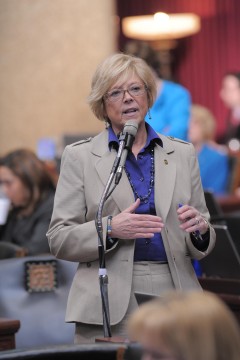ST. CHARLES, Mo. – When it came time to override Gov. Jay Nixon’s vetoes on labor issues like Right-to-Work and paycheck protection in the past two years, Democrats – with the assistance of some key Republican allies – have held the line and prevented Missouri from joining the 25 other states that have right-to-work laws on the books. While most of the Democrats are automatic ‘no’ votes on those issues, Republicans that break with their party face substantial pressure from leadership and outside donors.
Rep. Anne Zerr has faced that pressure. Now, she may make it into the Senate to become the third member of the GOP caucus in that body with a consistent record of voting for pro-labor policies after Sens. Ryan Silvey, R-Kansas City, and Gary Romine, R-Farmington. She says it’s not just a matter of principles, but that she’s actively looking out for the best interests of her district.
“My constituents are family people, working people, and many of them belong to unions,” she says, “Now, they have an option to vote for a Republican with their values as well someone who is a supporter of labor.”
But she faces some substantial opposition along the way in the traditionally Republican district.

Businessman, Air Force veteran and political newcomer Bill Eigel has received donations and endorsements from some of the most vocal anti-labor forces in the state, including the Missouri Club for Growth and David Humphreys who have donated a combined $175,000 to his campaign. He also has the support of prominent Senate Republicans like Sen. Bob Onder and Sen. Brian Munzlinger, who have donated to his campaign from their own campaign funds.
Rep. Mark Parkinson, who had once sought the seat, dropped out of the race in November with a letter that served both as a full endorsement of Eigel and a scathing critique of Zerr. He retired from the race specifically to not split the “conservative vote.”
Parkinson wrote that “ensuring that [Zerr] does not get promoted to the Missouri Senate is one of the most important tasks facing conservatives in 2016.” Parkinson also serves as the deputy treasurer of Eigel’s campaign, according to the Missouri Ethics Commission.
Eigel says that teaming up with Parkinson is “probably the proudest moment in the campaign.”
“A lot of folks expected that Mark and I were going to butt heads for the next year and split the ticket,” Eigel says. “But I’m very pleased Mark and I decided to work together and we exceeded everybody’s expectations by coming together, coming to an understanding and get on the same page. It’s been great working relationship ever since that time.”
Eigel has a resume that has become commonplace, but valued, during this election cycle. He touts his and his wife’s ability to grow their company, St. Louis Skylights, just as the Great Recession hit.
“Our timing was terrible,” he says with a laugh. “We had put in our entire life savings and the Recession kicks off. There were lots of challenges, and in spite of the challenges, we revamped the company.”
He also cites his experience in the Air Force – including his service overseas in Afghanistan, and most notably, he has never run for public office. Eigel believes that outsider edge, touted by statewide candidates like John Brunner, Eric Greitens, Bev Randles, and Josh Hawley, sets him in stark contrast with Zerr.
“Our life experience is entirely different from the life experience of someone who’s been in politics for 30, 40 years,” he says. “While she’s been down there running politics, she hasn’t been running a business, she hasn’t been serving in the military, she hasn’t had the real everyday experiences the rest of us are having in St. Charles County.”

Zerr has worked in public life either in St. Charles County or Jefferson City for the better part of four decades, which she believes shows her dedication to and knowledge of the district. Eigel on the other hand she notes moved into Weldon Spring in 2015.
“I know St. Charles,” she says plainly. “I’m not just moving into the district a few weeks before the deadline… I hear that from people going door-to-door and they take care of their own.”
Zerr and Eigel are also contending with a third candidate in the Republican primary. St. Charles County Judge Mike Carter has gained traction in recent weeks with a libertarian platform that calls for less government intrusion and a desire to rid of “campaign welfare” that might cause politicians to benefit their largest donors.
“Most of the people in these Republican circles talk about self-reliance… but every politician in these Republican primaries has their hand out waiting for free money to buy their votes,” Carter says. Carter, who prides himself on running a self-funded campaign, alleges that Eigel’s donations from business leaders and Zerr’s from union groups may cause them not to have the people’s best interests in mind.
“I want to say come to the front of the line,” he continues. “You won’t have to worry about being behind big money donors who are 300 miles away who gave one of my opponents $100,000 dollars.”

Carter’s ideas for policy, however, do not seem to stretch into the “topical” issues, or he at least prefers not to take sides, instead offering his own solutions. That may make it difficult for some voters to see exactly where he stands on traditional platform planks, but he wants to bring focus to other methods of government overreach and bureaucracy. He wants a statewide ban on red light cameras and automatic reapplication for government supervisory positions.
While Carter occupies his own field and offers a different approach, the battle between Zerr and Eigel displays the intraparty dichotomy that has also been prevalent this election as both Republicans and Democrats have found themselves fractured in two. Zerr considers herself a moderate Republican, socially and fiscally conservative but rooted in the working class. She points to her record on anti-abortion issues (both Zerr and Eigel are endorsed by Missouri Right-to-Life) and as a supporter of the Second Amendment for proof positive that she holds conservative values – even if she does not agree with most other Republicans on labor issues.
She also highlights her time as the chair of the House Select Committee on Commerce, which deals with much of the economic development legislation that comes through the body. She also handled Sen. Eric Schmitt’s “Boeing bill” in 2013 that gave over $1 billion in tax incentives to the airplane manufacturer so long as it created 2,000 jobs in the state over 10 years. So far, she said, Boeing was meeting those obligations.
“Because I focused on economic development, I was able to see incentives and job creation at a depth that other people weren’t afforded,” Zerr said. “There are some people who really dislike incentives to incentivize businesses. I’ve led the effort to establish that any incentive the state of Missouri offers is at least a one to one return on the state’s investment.”
On the other hand, Eigel represents the rejection of traditional, “establishment” politics that endeared people on both sides of the aisle to candidates like Donald Trump and Bernie Sanders. He got into politics after seeing the premiums on his health insurance skyrocket under the Affordable Care Act, and after hearing Rep. Dave Hinson, R-St. Clair, promote 2013’s Amendment 7, a large tax increase that would have paid for transportation infrastructure repairs, on the radio.
“When we have Republicans that are recommending tax increases as the only way to solve our problems, we have a real problem,” Eigel says.
Eigel believes that complacency and disconnect from average people hurts politicians’ ability to make the proper decisions for their constituents. He believes Zerr has fallen into that state as someone who has spent the better part of a 40-year career in politics.
“I like Anne personally, but when it comes to her policy, it’s a mess,” he says, denouncing her support of labor issues, her decision to block SJR 39, and her support of Amendment 7. “She represents the culture of abuse and corruption that I think is primarily the reason that people don’t trust their elected officials. Specifically, I’ve mentions when it comes to ethics reform, she takes hundreds of gifts from lobbyists worth tens of thousands of dollars, this is precisely why people hate politicians.
“Instead of just talking about conservative principles, I’m ready to go down there and vote for them.”
Zerr, on the other hand, notes that while some Republicans may not agree with the entirety of her record, she has a record, something both her opponents lack. And she says she has emphasized to voters how important it is to have experience to effect policy change.
“It’s a steep learning curve to learn the system, how it works, and how to get something done,” she says. “Without experience going into something, people don’t know what is happening and how to get things done. People can easily be taken advantage of. I don’t think it’s productive. People are looking for a productive approach to public policy.
She urges voters constantly to look at qualifications and not just whether or not someone is an “outsider.”
Carter can point to his legal career and time as a judge to show his experience. He follows the idea that government should act like a business, and not just in penny-pinching. He wants the government to prove to people that it deserves their support.
He says he wants to see government “treating the public as though they are a customer who may not come back if we don’t treat them kindly and with a lot of respect.”
Whichever path Republicans in the 23rd Senate District choose in a few weeks, it could say a lot about how the fractured party forms over the course of the next four years.











